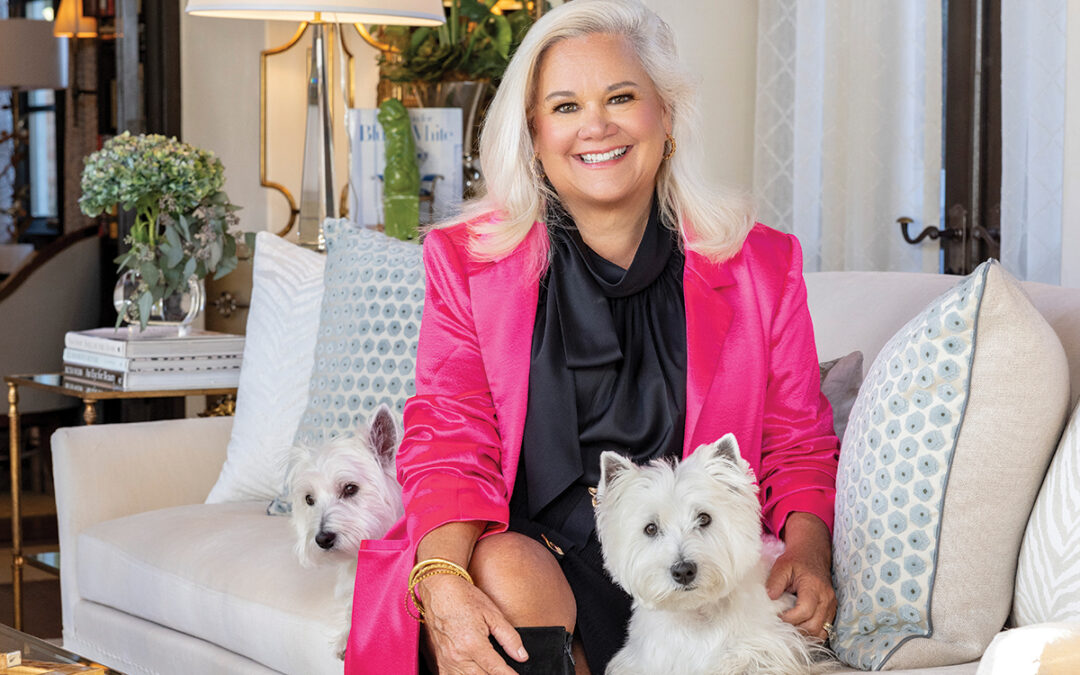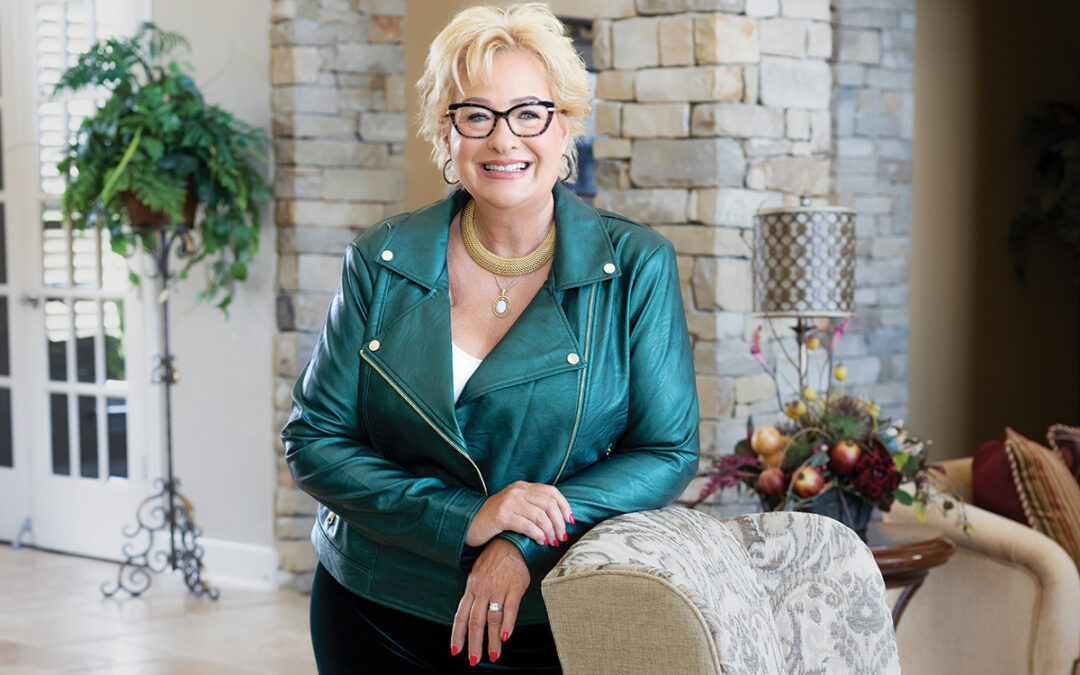If her family had paid closer attention to the road signs along the way, they would not have expected Julie Smith Nelson to follow the example of her mother, a traditional, if somewhat feisty, stay-at-home mom.
Nelson, who has always had her own ideas and the drive to carry them through, chose seven years ago to follow her father and grandfather into the security business. She is owner and chief executive officer of Smith Legacy Security, the largest privately owned security company in San Antonio. Her services include providing companies with uniformed security guards — some commissioned to carry a gun — armored cars and employee screening checks.
“I like to work. I was always looking at things from a business perspective,” says Nelson, who started her first commercial venture when she was 16 years old. “That’s when a friend and I began making cookies and sewing bodices and selling them.”
After graduating from Jefferson High School, Nelson went to San Antonio College and the University of Texas, where she concentrated on general studies and psychology. “I like understanding people, knowing what makes them tick,” she says. That pursuit has been invaluable in the hiring and management of 300 employees who work security for Smith Legacy at 150 locations.
Nelson made her professional debut in the world of commerce as a loan processor and later as a loan officer at Mission Mortgage Co. She left that job in 1992 to test the waters at her father’s company, Sterling Smith Security, as a sales representative. She progressed through the positions of sales manager, personnel manager and operations manager before leaving the company in 1998 to start her own business.
She called her company Smith Legacy Security in honor of her father and her grandfather. In 1928, her grandfather, Stanley Smith, launched the family into the security business with a private detective agency that he operated until he won the security contract for HemisFair ’68. Stanley Smith Security became the sixth largest security company in the United States, with more than 8,000 employees in 26 states.
Nelson found herself in the right business at the right time. The Sept. 11, 2001, terrorist attacks on New York and Washington, D.C., moved national public and private security consciousness from a marginal concern to the top of everybody’s list.
“We were absolutely swamped with calls after 9-11. We immediately started beefing up to meet the demand,” says Nelson, whose company at the time was providing security for such frontline San Antonio companies as Lockheed Martin and Dee Howard Aircraft Maintenance.
The elevated security consciousness that followed 9-11 precipitated a bit of a flap at City Hall. On Oct. 22 of that year, Smith Legacy Security was awarded a $1.6 million contract to provide security guards for the buildings and facilities owned by the City of San Antonio even though her bid exceeded her competitor’s by a half million dollars. The reason for the differential, Nelson says, was that she pays her guards $7 to $10 an hour. That amount is higher than the going rate for security guards.
“It’s crazy to pay somebody $5 an hour, put a loaded gun in his hand and give him the responsibility of protecting a multimillion-dollar company. I wish I could pay them more, but I can’t do that and stay competitive,” she explains. “These guards are not doing this just for the money. There certainly are better paying jobs with better hours. We go to work when other people are going off, and we work holidays and weekends. We don’t just provide a warm body. We provide our clients with guards who like to take care of people,” she says.
In November 2003, two years after the 9-11 attacks, Nelson bought out Ranger American Security’s San Antonio operations. She also began expansion of Smith Legacy, establishing satellite offices in Houston, Louisiana and South Texas.
She currently is in the process of incorporating into her business a fingerprint scanner, which she conceived of and had designed to her specifications. The device functions as a super-smart time clock. It consists of an electronic keypad fitted with a fingerprint scanner that verifies the identity of the security guard. Using the same technology as the wireless digital phone, the Interactor sends a signal to a central computer that the guard has checked on or off the job. If the guard fails to show up at the appointed hour, it reports that as well. Nelson says correction officers might use the device to supervise house arrests of conditional parolees.
Anyone who assumes that Nelson’s rise in the security business has been a piece of cake would be in error. For one thing, her schedule doesn’t leave a lot of time for a private life. She and her husband, Bobby Nelson, grew up in the same neighborhood, where she was the youngest of the four children in her family. “He told me he used to jog by my house and hope I would come out and serve him lemonade or something,” she says.
That didn’t happen, so six years ago his brother Danny intervened. He told Julie during the meeting of a committee on which they both served that his brother wanted to ask her out. Eight months later the couple were married. They have two children: Duke, who is 3, and Scarlett, who soon will be a year old.
Nelson says that Bobby is not the sort of man to be put off by a strong woman. “He has always been my staunchest supporter. He’s been more instrumental in my success than anybody. He’s the one who always said, ‘Buck up, let’s go. Let’s do it.’ He is always understanding,” she comments.
Bobby Nelson was by no means the only fellow to have eyes for Julie. She recalls a client telling her that once when she walked by him at a Spurs game his companion made a fresh remark about her appearance. The client said, “Hey, watch your mouth. That’s my security person.”
Nelson says that not long after she started her company she was convinced she had jumped in over her head. “This is a tough, tough business. In security there is no secret sauce. You have to juggle a lot of different things,” she says. At that moment she began asking, “What was I thinking when I got into this business?” Her father answered, “You can’t help it. It’s in your blood.” He came in temporarily to help her over the rough spot. Her husband also pitched in. He quit his job with SBC and worked with her for two years. He currently is part owner and chief operating officer of Insurance & Bonds Agency Inc.
The Nelsons are never too busy to make time for each other. “We have a date night once a week,” Julie says. They also make time to get away to the coast, where they enjoy jogging and fishing and just being together as a family. “I owe a lot to my husband and so much to so many other people,” Nelson says. She describes her mother, Jo-Lynne Smith, as “a hot stay-at-home mom.”
An activist in her homeowners association and a member of the San Antonio Conservation Society, Jo-Lynne Smith doesn’t hesitate to beard the mayor in his chambers when she feels the public good is at stake, Nelson says. “My mother appreciates all of our good qualities. She was instrumental in developing my self-confidence. She is tiny — only 5’1″ tall, but she taught me to stand up for myself and not to be afraid of anything.” She did that job so well that one of Nelson’s clients told a third person, “She’s so tough on them that we don’t call her when the security guards do something wrong.”
Nelson has a babysitter for her children, but often brings them to the office so she can be with them during the day. The members of her staff keep treats in their desk drawers for them and lend a hand with the babysitting. “All the people on my staff are wonderful. I couldn’t get through the day without them,” Nelson says. When the children are not in the office or with the babysitter, they like to spend time with their grandmothers and with Nelson’s sister, Hallie, who stays at home with her three daughters. “I couldn’t do this without the support I get from my family,” she says.
Community involvement is something else Nelson makes time for. She is director-elect of the board of the Young Entrepreneurs’ Association. She also serves on the board of the National Association of Women Business Owners, an organization that has been a huge eye-opener for her. She explains, “Those women of 20 or 30 years ago were the tough ones who made it happen. They paved the way for the rest of us. South Texas still is a little bit of a good ol’ boy network. But those women couldn’t even get a loan unless their husbands signed for it. That’s something to think about.”
Author: Loydean Thomas
Photographer: Liz Garza Williams









0 Comments